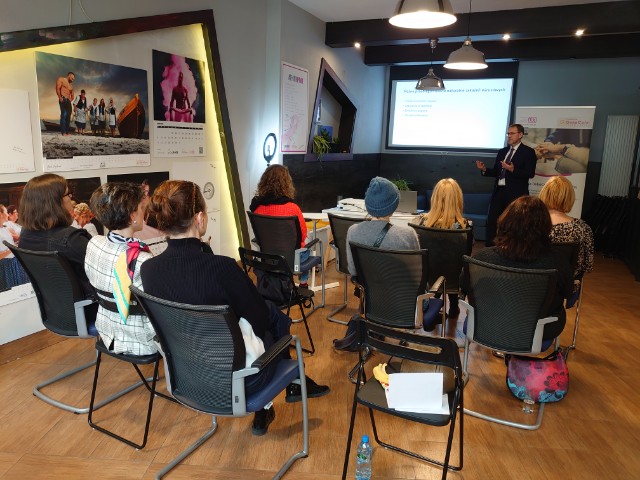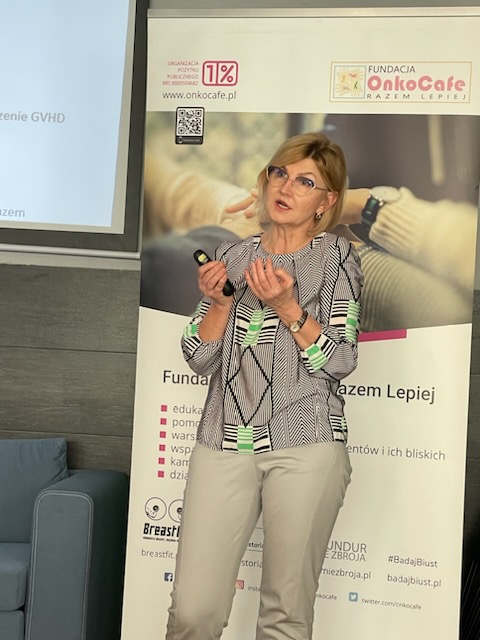COVID-19 has become a disease primarily of immunocompetent people, experts say. Moreover, immunocompetent patients are also at particular risk of a severe course of other infectious diseases. It is extremely important for them to have access to prophylaxis and appropriate management. This was discussed at a workshop for leaders and staff of patient organisations organised by the OnkoCafe - Together Better Foundation by Prof. Iwona Hus, MD, PhD, and Prof. Krzysztof Tomasiewicz, MD, PhD.
More than three years have passed since the first case of SARS-CoV-2 virus infection was detected in Poland. During this time, both the disease caused by the coronavirus and the possibilities for prevention and treatment have undergone enormous changes. It can also be said that we have already become accustomed to COVID-19, but this does not mean that the disease has ceased to be dangerous. As experts point out, it now poses the greatest threat to patients who are immunocompromised - such as haematological patients.
– What does the risk of infection in cancer patients depend on? Among other things, on the disease itself. Definitely selected haematological diseases will be an aggravating factor. Then there are factors depending on the treatment: whether we use more or less immunosuppressive treatment, but also on the doses of the drugs. If we are using high-dose chemotherapy, for example, this will certainly be more of a problem. Immunosuppressive treatment, because we are also talking about transplants, including organ transplants, results in an increased exposure to infectious complications and such patients are among the most vulnerable patients - explained Professor Iwona Hus, MD, President of the Polish Society of Haematologists and Transfusiologists.
– Now we are receiving a lot of patients from COVID-19. Yesterday alone we had 20 severe cases requiring hospitalisation. If we discharge, for example, 6-7 patients on a given day, within an hour the ward is full again. COVID-19 has completely changed its face. Whereas previously we used to say that primarily obese patients, patients with diabetes, cardiovascular disease, kidney disease are the groups most at risk of severe disease, now COVID-19 is a disease primarily of immunocompromised patients - said Professor Krzysztof Tomasiewicz, MD, PhD, Vice President of the Polish Society of Epidemiologists and Doctors of Infectious Diseases.
During the workshop, experts spoke, among other things, about how and from which diseases immunocompetent patients should be protected. The basis for many infectious diseases is vaccination. Prof Hus even emphasised that advanced age or the presence of chronic diseases, as well as haematological diseases, are additional indications for vaccination. Unfortunately, the opposite statements can often be found.



At the same time, the expert stressed that vaccination will not always be sufficient protection. An example is, for example, vaccination against COVID-19 in haematooncology patients.
– Haematooncological diseases increase the risk of death with COVID-19 infection. We have a more severe course of the disease, a higher mortality rate than in healthy individuals, and a poorer response to vaccination. Populations at risk of a severe course of COVID-19 due to inadequate response to vaccination include patients with chronic lymphocytic leukaemia, especially during active treatment, patients treated with therapies directed against B lymphocytes, patients with acute leukaemia undergoing treatment or patients undergoing haematopoietic cell transplantation - enumerated Professor Iwona Hus.
The experts indicated that for those specific groups of patients with the highest risk of severe COVID-19 and associated hospitalisation, as well as the risk of death, the combination of the long-acting monoclonal antibodies thixagewimab and cilgavimab should be given additional protection in addition to immunisation.
– The preparation of ready-made antibodies allows us to further protect immunocompetent patients. The administration of the ready-made antibody can cause it to bind to the virus, which thus prevents it from entering the cell, i.e. it can neutralise it. This may provide protection against the infection itself, but it may also be the case that some of the viruses pass through this sieve, but then the course of the disease is much milder. In infectious diseases, there is a term such as infectious dose. If these viruses are less than this dose, our body will fight them off. This preparation makes it possible to avoid infection to a large extent, or at least to avoid a severe form of the illness. - explained Professor Krzysztof Tomasiewicz.
The title of the workshop organised by the OnkoCafe Foundation - Together Better was "Infectious diseases. How to empower the most vulnerable?". The meeting was aimed at leaders and staff of patient organisations, especially those who have under their care and support immunocompromised patients. As Anna Kupiecka - President of the Foundation - emphasises, prevention education is one of the main missions of the organisation she heads.
– Since the inception of our Foundation, we have attached great importance to educational activities and the promotion of preventive health care. We have carried out many campaigns targeting both oncology and haemato-oncology patients as well as the general public, in order to draw attention to the fact that prevention should be our everyday life. Immunocompromised patients, who are particularly vulnerable to severe infectious diseases, require a tailored approach on this topic. That is why we have invited eminent clinical experts and representatives of patient organisations to talk together about what can be done to minimise this risk. I am convinced that the knowledge we gained from this workshop will be passed on to those directly affected by this topic - Anna Kupiecka concludes.

